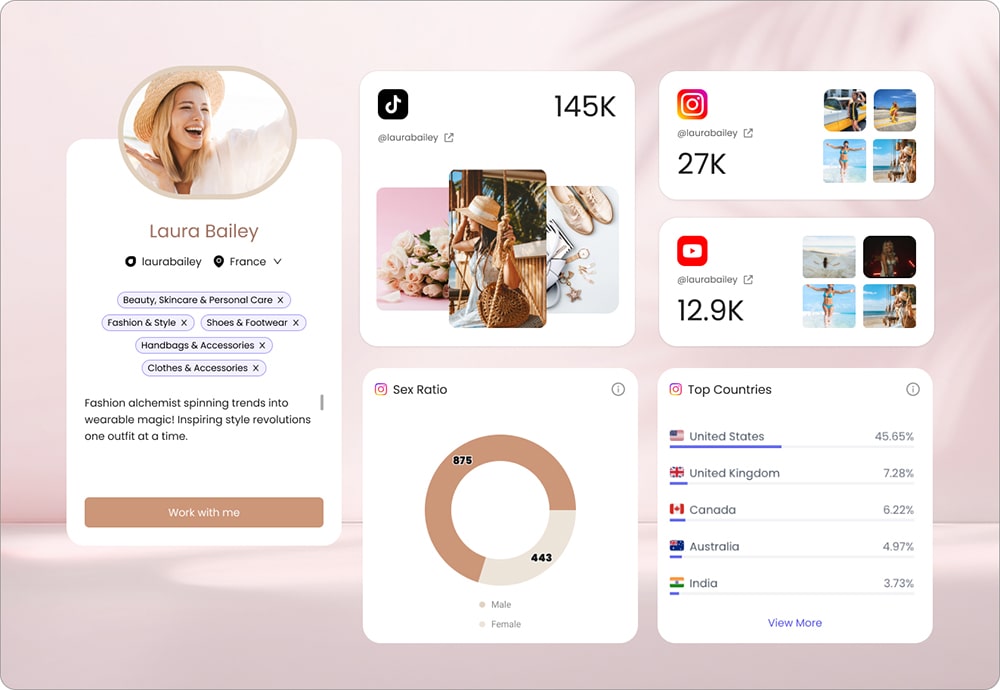Influencer marketing is one of the best marketing options you could choose for promoting your brand or service. After you’ve found an influencer, the next step is finding the best ways to work together.
What does an influencer want? What do brands want?
A good partnership means both parties get what they want. Influencers want to know they are collaborating with a respectable company that will treat them professionally, give them the opportunity to create creative content, and pay them the agreed amount on time.
Brands want their content and their product to be shown in an effective way, after which they will get their expected results from the partnership.
To make sure you get what you want, I suggest you start signing an influencer contract which will take your collaborations into a more formal stage. And believe me, you will both enjoy a more profitable partnership.
Why do marketers need an influencer contract?
Marketers and influencers often discuss all the terms and conditions via messages or calls. This may be convenient, especially as it is the fastest way of trying to get a deal, and it creates a friendly atmosphere between both parties.
But during this process, both parties can miss some important points — either because they forget, or on purpose — which can cause many misunderstandings and unpleasant situations between them later on.
When doing an influencer marketing campaign for one of our products I had a brand deal with an influencer. We paid him and he shared our product with his followers. A few hours later he asked me if I would like him to share our content on his other page.
I thought, “Why not?” And answered YES!. After 24 hours he got back to me and asked me to send him money for the second page. Picture my surprise! Here I was, thinking that he was offering to do something that required no effort, in order to strengthen our partnership… but he had another intention. As he hadn’t mentioned anything about the payment for the second page, it took us a lot of effort to negotiate and make everything right.
Or there was another case where an influencer received the product and posted about it without even opening the package! He didn’t mention the brand’s page and used the wrong link. If we had had an influencer contract from the beginning we wouldn’t have gotten into these kinds of troubles, as an influencer contract is the best way of avoiding these kinds of misinterpretations.
What type of contracts do influencers have?
Influencer agreements, much like contracts in any other industry, greatly vary depending on the aims and types of the cooperation. As such, there are several types of influencer contracts that you may want to consider using in your influencer partnerships.
- Independent contractor agreement or influencer contract – This is the contract type that outlines the relationship between your brand and the influencer, including the scope of the campaign, timelines, and payments, among other details.
- Non-disclosure and confidentiality agreements – As the name suggests, these contracts address the sensitive information shared during the cooperation, and aim to protect your brand from data leaks.
- Exclusivity agreements – These contracts prohibit the creator from working with your competitors for a specific amount of time. The period can be clearly defined (e.g. 3 months after your cooperation), or undefined, for long-term cooperations or brand partnerships.
- Vendor contracts – In case the creators are working with third-party vendors (e.g. photographers or video editors), vendor contracts are used to determine the scope of the vendor’s involvement in the campaign.
- Indemnification contracts – These agreements are aimed to protect your brand from any legal action that can stem from the content or the actions of the influencer, including false advertising or copyright infringement.
- Letter of intent – Now, you can think of the letter of intent as the preliminary influencer contract. It’s a non-binding document used to outline the terms of the cooperation before the official influencer agreement is signed.
What Should You Include in An Influencer Contract?
As mentioned earlier, there is no one “right” influencer contract; and the final look of your contract will largely depend on the type of your cooperation, the relationship you have with the influencer, as well as the specificities of your industry. That said, however, there are several items commonly included in most influencer contracts you may want to consider.
Brand exclusivity
Brand exclusivity requirements are quite common in long-term brand-influencer partnerships: for many brands, it’s important that the creators they work with long-term do not cooperate with their competitors, as it’ll negatively impact both the brand image and the campaign performance. Though less often, brands require exclusivity for short-term cooperations too, although this requirement is mainly limited to requiring the creator to not cooperate with a competitor for a clearly specified time after your cooperation. Now, if you expect the creator to not engage with competing brands, make sure to include the information in your influencer contracts in detail.
Brand campaign guidelines
As a brand, you probably have certain brand guidelines you follow. To ensure that the influencer cooperation matches your standards and fits your brand image, make sure to include all the relevant information about your guidelines, including the style and tone, in the contract.
Influencer campaign guidelines
Similar to your brand, influencers you work with are also likely to have certain guidelines related to their personal brand, including specific guidelines they follow to ensure the authenticity of their content and the quality of their cooperation. Make sure to discuss their guidelines with them, and include those in the article as well.
Content requirements, timelines, milestones, and deliverables
You as a brand are likely to have certain expectations from your cooperation with the creator throughout every stage of the campaign. To ensure that the partnership goes smoothly and without any misunderstanding and unmet needs, it’s important that you discuss the campaign timelines, milestones, content details, and campaign deliverables with the creator in detail, and then make that information part of your contract.
Compensation models and timelines
The compensation models can also vary from cooperation to cooperation, ranging from product seedings and percentages from sales through to a fixed amount for the partnership. Your influencer contracts should be clear on the terms of the payments and the payment timelines, so the creators know exactly when and how they are going to receive compensation. You can use influencer rate sheets to get additional information about compensation for each type of influencer.
Content rights
While the content influencers create about your brand is made in the frames of cooperation, unless specified otherwise, you don’t own that content. Therefore, if you plan to use user-generated content in the future as part of your marketing efforts, it’s important that you have a written agreement with the creator. Discuss with an attorney and the influencer all the key points of who has the rights to the content, to avoid any potential legal issues.
NDA and confidentiality agreement
This will vary on a case-by-case basis, but some cooperations with influencers may require you to share sensitive information with them. This can be login information (for example, in the case of Instagram takeovers) or other classified information about your business. In these cases, it’s critical that you include an NDA clause in your contract specifying exactly what information shouldn’t be shared.
Consumer privacy law
You need to consider the consumer privacy law mainly in the frames of affiliate marketing campaigns. In this case, influencers may sometimes collect consumer data, and if this happens, and if the data is mismanaged (think of data breaches, among other potential issues), you may be held accountable. Therefore, include an appropriate clause in the contract that will ensure that appropriate steps are taken to ensure consumer data privacy.
Termination grounds
Unpredicted situations happen and partnerships, unfortunately, don’t always work out. To protect yourself, you’ll want to include a termination clause in your contract, stating what constitutes grounds for termination, for both parties.
How to Identify What You’ll Need in Your Influencer Agreement?
As a brand, you probably know quite well what you want to achieve through your campaign and the influencer partnership. However, when it comes to your influencer agreement, identifying what you’ll need can be lightly more complicated, especially if you don’t yet have much experience with the document.
That’s why, once you’ve agreed with the influencer about the cooperation and need to prepare a contract, it’s a good idea to consult with an attorney or advisor who has experience in this area. They can help you navigate the legal aspects of influencer marketing in all of its nuances, and help you draw up an agreement that is comprehensive, campaign-tailored, and protects your interests.
When working with the attorney, you’ll want to discuss the scope of the campaign, outline the compensation structure, the content creation, approval, dissemination processes, and other relevant campaign-specific information. This way, you can ensure that your influencer agreement covers all the necessary legal components of your cooperation.
Influencer contract resources to check
In the beginning, the legal aspect of influencer marketing can seem a little daunting. Luckily, there are quite a few influencer agreement templates and forms available for free you can use to simplify and streamline the process. Here are some of them:
- 40+ Editable influencer contracts
- Customizable social media influencer agreement generator
- Free influencer contract template from LawDistrict
These templates can give you quite a good idea of what influencer contracts should look like.
Alternatively, you can address the legal aspect of your brand’s influencer collaborations by creating and managing your campaigns through dedicated influencer partnership platforms. These platforms are dedicated to bringing creators and brands together and simplifying the logistical part of their cooperation, and as a rule of thumb cover the influencer contracts in their terms and privacy policy.
Conclusion
Hopefully, I could deliver some value and show the importance of the influencer contract.
However, remember that not everything is black and white. If you have found the perfect influencer who you are really seeking to work with, but avoid working with influencer contracts… just try to make sure that everything is certain and agreed upon by chat or a call.
Even though it’s not as binding as a contract, it can really help to avoid any kind of unpleasant situations and misunderstandings further on in your collaboration. Stay tuned for more.
Reviewed By Rem Darbinyan
Revolutionizing industries with AI, Rem Darbinyan is the CEO of ViralMango and an entrepreneur, AI expert, and influencer marketing strategist.




